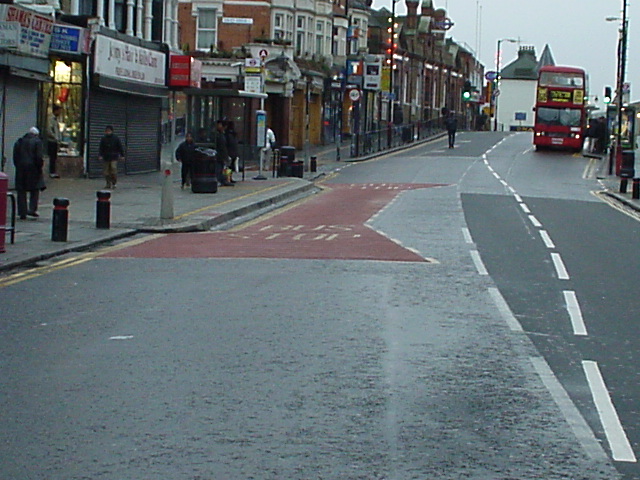

The experimental phase of the project compared the performance of different buses with three types of kerb which have been designed for use at accessible bus stops. The aim is to test different kerb types with different low floor buses. The experiments have provided a large amount of information about vehicle approach path, crossfalls, surfaces, problems with height differences. They were also undertaken with wheelchair users, testing their ability to board and alight the bus. Issues surrounding horizontal and vertical gaps between a stationary bus and the platform have been considered, as have the effects which arise while the bus is in motion as it approachest he platform.
The experiments confirmed the benefit of on-street guidance and also the usefulness of marking a particular kerb to help the drivers approach the stop correctly.
A small number of bus stops have been constructed in London to reflect a variety of different operating circumstances and design constraints. These bus stop environments are constructed to be fully accessible for all kinds of users' groups, especially elderly people, mobility-impaired people, women, children and ethnic minorities. The project designed the bus stop infrastructure facilities by examining aspects including seating, information, lighting, shelter, weather protection and personal security. It also considered pedestrian access infrastructure, examining aspects of footways, kerbs, gradients, maintenance to show what can be done to help people improve their ability to travel around their local area.

An EXCALIBUR bus stop
Driver training is a key ingredient of the implementation process. The monitoring phase began after the bus stops were completed and before driver training had been started. This allows us to compare the effects of the training on performance at the bus stops.
A brief summary of the EXCALIBUR bus stops has been included in Transport for London's Guidelines on Bus Stop Layouts for Low Floor Bus Accessibility , which is an output of the London Bus Initiative.
The London Borough of Newham provided officer support for the project.
TYLER, N.A. and M.CAIAFFA (1999) EXCALIBUR Project - Experiment III: Performance of the Guidance System with Different LowFloor Buses. University of London Centre for Transport Studies Working Paper.
TYLER, N.A. and M.CAIAFFA (1999) Design of Fully Accessible Bus Stops Infrastructure Elements for Buses and Drivers. Proc. European Transport Conference, September.
CAIAFFA, M.M. and N. TYLER (1999) Projeto Excalibur - Um exemplo prático para verificar as inter-relações dos principais elementos da infra-estrutura de pontos de ônibus ônibus com piso baixo. Paper presented at the X CLATPU - Congreso Latino Americano de Transporte Público. Caracas, Venezuela, December. (in Portuguese)
TYLER, N.A. (1996) Accessibility to the Bus System. Working paper, University of London Centre for Transport Studies, London.
TYLER, N.A. (1996) Access Facilities for Buses. Working paper, University of London Centre for Transport Studies, London.
(Back to the Accessibility and Public Transport
Research at UCL page)